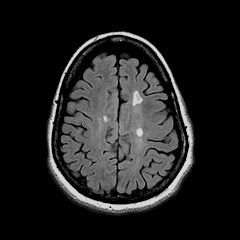
I'm losing my mind, and I have proof. I took part in a small study this summer that involved 3 hours of cognitive testing and two hours in an MRI machine. Two groups of women were matched for age and education levels, were tested and MRI-ed. One of the groups was made up of relapsing remitting MSers; that was my group. There was a significant difference found between the two groups: the MSer's response time to the testing was slower than the non MSers. As well, there were differences in size of certain parts of the brain; the MSer's parts were smaller. To put this in perspective, response times were measured in thousandths of seconds. So a difference between .600 seconds and .700 seconds (a tenth of a second) is really small in the grander scale of things. But the differences were still significant. I am losing my mind but at a fairly slow rate. This is a simplified version of the results of the study and keep in mind that it was a small sample size.
There are a number of components to brain function. Two of the main components are electrical and chemical. What we eat or ingest will affect those two components. Not enough sleep will affect those two components. In fact, anything we do or don't do will affect those two components, either positively or negatively. Whatever you do to or with your body will affect your brain, because it responds to the electrical and chemical activity of the body.
So somehow a microbe or lack of Vitamin D (or the alignment of the stars) affects your body. Your body and brain respond to that. If you're like me, your body starts to destroy the myelin in your brain. That one response causes more responses. Initially, I lost the use of the right side of my body for a short time and lost the feeling for a longer time. So as the myelin was being eaten away, which is an injury, an inflammatory process was under way. (The same thing happens if you get a bug bite. There's a slight inflammation at the site of injury, which is chemically induced.) Then a repair process begins and scar tissue forms.(Just like a bug bite) The scar that remains might be enough to allow complete or near-complete recovery, but like a repaired electrical cord, may not be as efficient as the original.
So what does this mean for cognitive ability? Think about all the chemical reactions going on inside your brain during an MS attack. And your neurons are firing but getting no results from your body. Maybe your fatigue is keeping you on the couch instead of going to the gym. Maybe you don't have the energy to prepare a decent meal. Maybe you can't focus your mind enough on a crossword puzzle. All these things contribute to declining cognitive ability.
And now we can show evidence of brain atrophy in people with MS.
As with many things in science, one discovery leads to more questions. Is it the disease that causes the atrophy or is it a byproduct of the disease? If we're not eating, sleeping, or exercising as we should, is that causing the atrophy? It may be a vicious circle as well. The question we can answer at the moment is "What can we do now to minimize the damage?"
The answer is right in front of us: Eat right, sleep well, exercise your body and your mind, and find some coping mechanisms to handle the "brain farts". In my case, at work, I write down everything I need to speak about when on air. They are just short notes with info that's relevant, but it gets the job done. I cross them out when I've used them so I don't lose my place. I have grocery lists that are great (when I remember to take them with me) and I sometimes make up to do lists. I leave things on the floor in front of the door so I remember to take them with me.
Eating, sleeping, and exercising are going to be future blog posts. Especially since two of the three are favourite activities of mine.
S.


